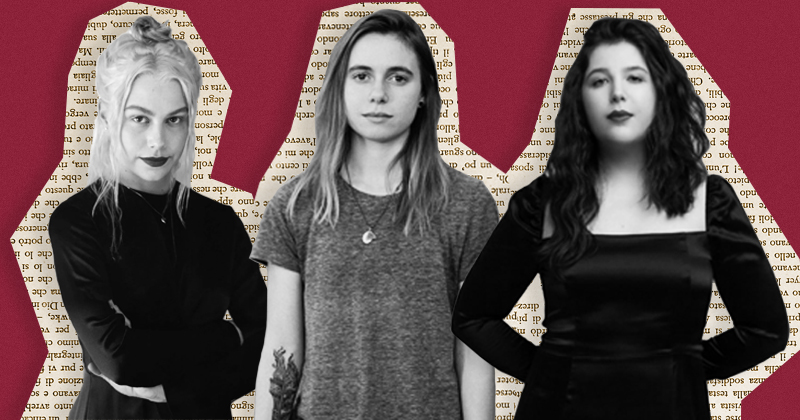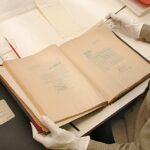The boygenius book club: 48 books the indie rockers think you should read.
Late last week, a new profile of boygenius—the “world’s most exciting supergroup,” in case you didn’t know, consisting of Phoebe Bridgers, Lucy Dacus, and Julien Baker—reminded us all that they are huge book nerds. (They also dropped some new music, but that’s really beside the point.) “Boygenius likes to read, and I do not mean that in a casual sense,” wrote Angie Martoccio in Rolling Stone. “A majority of our lunch is spent discussing literary fiction, where they ping-pong across the table with their recent reads. Rachel Yoder’s Nightbitch. C.S. Lewis’ The Great Divorce. Jenny Offill’s Weather. Leslie Feinberg’s Stone Butch Blues. And Rebecca Rukeyser’s The Seaplane on Final Approach, which Bridgers gives me a copy of the following day.” Henry James’s The Portrait of a Lady and Elif Batuman’s Either/Or were also in the mix.
If this makes you wish you could be in a book club with boygenius, you’re not alone. They might be a little busy, though—so here’s the next best thing: a roundup of (almost) all of the books the indie rockers have mentioned in interviews and other profiles. (Lucy Dacus is also very active on Goodreads, but I won’t replicate her entire shelf here; and of course the Emily Dickinson of it all is implied.) It might go without saying, but they have very good taste—their selections tend to be a mix of edgy contemporary fiction and classics (both literary and philosophical), plus a childhood standby and a wild card or two. Happy reading:
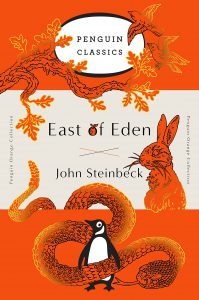
John Steinbeck, East of Eden, recommended by Julien in Vulture:
While I was in the middle of writing [Little Oblivions], I was having a crisis of belief about myself. The more self-destructive behaviors I repeated and the more ways that I failed miserably to live up to the ideals I held for so long, then the worse that I felt about myself. I remember one of my friends coming over to hang out with me, and they said to me the quote from that book, “Now that you’re not perfect, you can just be good.” There’s been seldom a literary moment that’s made me so emotional.
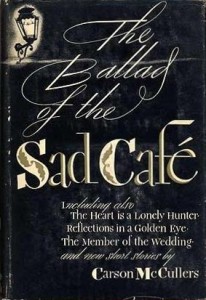
Carson McCullers, The Ballad of the Sad Café and Other Stories, recommended by Lucy in Southwest Review:
She’s just so good. She packs so much emotion into setting each scene that when the action happens, it feels inevitable.
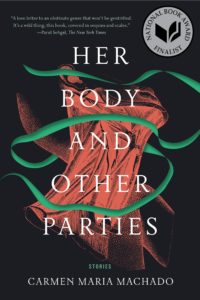
Carmen Maria Machado, Her Body and Other Parties, recommended by Phoebe in One Grand:
Horny, spooky, sad, smart, queer, funny…maybe my favorite book of all time. And if you’re into Law and Order SVU fan fiction, look no further.
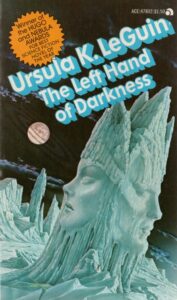
Ursula K. Le Guin, The Left Hand of Darkness, recommended by Lucy in The Creative Independent:
Julien just had me read The Left Hand of Darkness, by Ursula K. Le Guin, which is awesome and totally sci-fi and nerdy. I’ve grown a heart for sci-fi in the past year or two ‘cause it’s so different from the real world. It feels like a hard exit. When I’m in the van, it’s nice to jump into something that’s completely different from where I am.
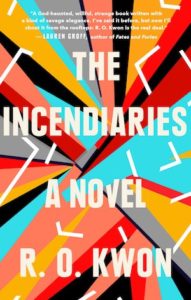
R.O Kwon, The Incendiaries, recommended by Julien in Vulture:
That book is about a cult. It’s so fascinating to me—and I think Kwon does a really good job of illustrating this—how, when you get right down to it, really anybody can be in a cult. I mean, look at the Capitol [insurgence]. Those people are motivated by a belief system that has long ago departed from anything you could consider rational, and which is now basically a mixture of emotional manipulation and propaganda.
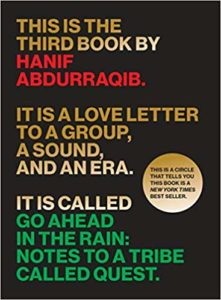
Hanif Abdurraqib, Go Ahead in the Rain and They Can’t Kill Us Til They Kill Us, recommended by Lucy in The Creative Independent:
I’m also reading Hanif Abdurraqib’s new book, Go Ahead in the Rain, about A Tribe Called Quest. I feel way more connected to that band, and to him. He has such a unique way of bringing care out of people. With They Can’t Kill Us Til’ They Kill Us, I felt like he encouraged more compassion out of me with every essay.
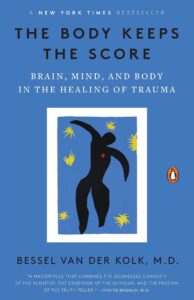
Bessel van der Kolk, The Body Keeps the Score, recommended by Phoebe in One Grand:
People have been trying to get me to read this book my entire life. My mom, various friends and partners, but I hate when people think I will like something. Especially when that thing is about trauma and mental illness. But I finally read it at the beginning of this year, and I can’t believe I made it this far without it. It is sort of traumatizing in itself, but it inspired me to finally set up a session with a good therapist.
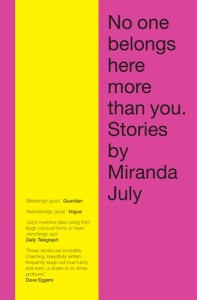
Miranda July, No One Belongs Here More Than You, recommended by Lucy in Vogue:
One of my favorite short story books of all time. Miranda July is uniquely capable of extending understanding to the freak within us all. Her characters are weird, real, broken, and vibrant.
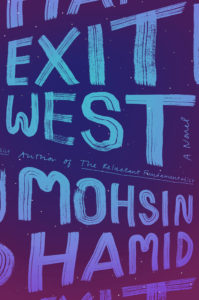
Mohsin Hamid, Exit West and Arundhati Roy, The God of Small Things, recommended by Julien in The Irish Times:
I love Exit West by Mohsin Hamid. It’s a magical realism retelling of the refugee experience, where people find these magical doors that transport them to another country. I’d say it was an allegory for the refugee crisis, but I’d never want to impose my own interpretation of it. I feel the same as when I read Arundhati Roy, who wrote The God of Small Things. They go one step beyond an empirical, perfunctory analysis of the situation, which can be useful but a little dry, and instead they present you a problem in all its humanness. So instead of an anthropological discussion of how we create communities, why we exclude people and why we fear threats to the status quo, it tells you a story that illustrates those things in an implicit way.
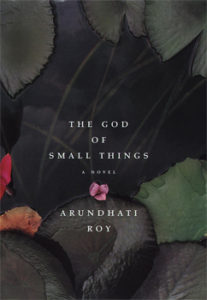
Arundhati Roy, The God of Small Things, recommended by Lucy in Vogue:
This is a beautiful, complex, captivating story and setting. Can you describe a book as humid? It’s thick with color and feeling, love and confusion.
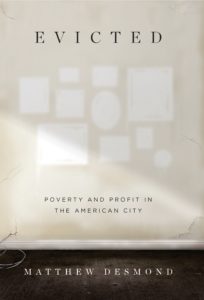
Matthew Desmond, Evicted, recommended by Julien in The Rumpus:
Recently, I have been reading a book called Evicted by Matthew Desmond. It’s one of the best nonfiction books I have read in a very long time. The purpose of it is to show how deeply connected housing is to the poverty crisis in America and expose how flawed housing law is, how it shapes neighborhoods and cities, how it contributes to structural inequality. But the book is written in the form of a narrative. Desmond just chronicles the lives of several people living in Milwaukee to create a vivid depiction of the reality that they face. It’s unlike a lot of books that I read about policy or economics in that it’s extremely human, rather than a solely academic argument.
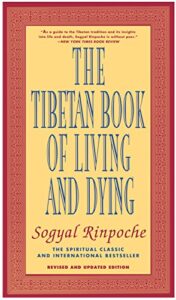
Sogyal Rinpoche, The Tibetan Book of Living and Dying, recommended by Lucy in The Creative Independent:
I’m always reading the Tibetan Book of Living and Dying. It’s a spiritual text that is everything I want from a spiritual text. Always talking about how to live in a way that makes you be at peace with your death, and how that can proliferate into your relationships. Getting rid of unhealthy attachments. I read a paragraph at a time and I feel like I’m sated spiritually for a month.
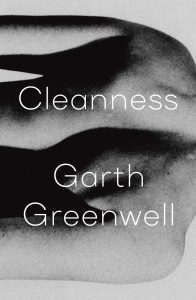
Garth Greenwell, in general, recommended by Lucy in Vanity Fair:
Probably one of the best sex writers alive.
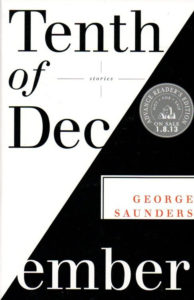
George Saunders, Tenth of December, recommended by Phoebe in One Grand:
The kind of book you finish and walk around in a weird fog for a couple days. The coolest thing to me about George Saunders is his ability to create wildly different characters, and make you empathize with each one. As someone who writes pretty much exclusively from my own perspective, this is a mysterious gift.
And by Lucy in Vogue:
Another fantastic short story book. Saunders balances humor and horror in a way that leaves you with lingering questions about the nature of humanity.
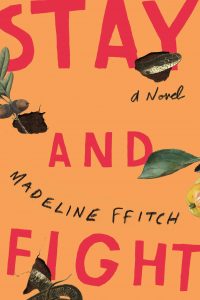
Madeline ffitch, Stay and Fight, recommended by Julien in The Au Review:
I just recently read this book about this kind of clandestine queer community in rural Appalachia called Stay and Fight, that I really like.
And by Lucy in Southwest Review:
There’s a book called Stay and Fight by Madeline ffitch that is well-loved within my circle of friends, but I wish more people would read it. It has a lot to do with found family, rural life, the reality of living from the land, and lesbian parenthood.
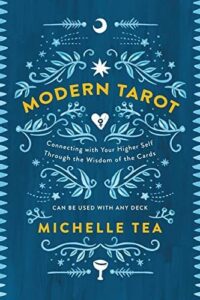
Michelle Tea, Modern Tarot, recommended by Phoebe in One Grand:
I’ve loved tarot since I was a kid, but learning to read it has always seemed like a chore. And tarot books for the most part are just super boring. Still, I love this book. Michelle Tea is a queer witch poet and author who does an incredible job of humanizing every card. I brought it to the studio to kill time with my band between takes, and most of them bought copies.
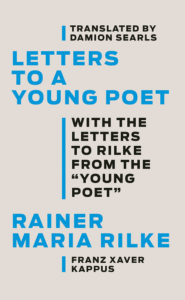
Rainer Maria Rilke, Letters to a Young Poet, recommended by Lucy at Penguin UK:
I remember lessons from this a lot. It’s so wise and gentle. I’ve underlined this: “The more still, more patient and more open we are when we’re sad, so much the deeper and so much the more unswervingly does the new go into us. So much the better do we make it ours.” That’s great.
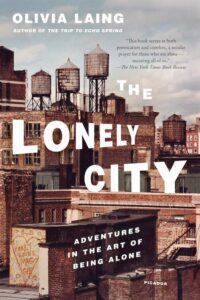
Olivia Laing, The Lonely City, recommended by Julien in Paste:
I recently read this incredible book by Olivia Laing called The Lonely City, and it was about the childhoods of several artists who lived in and around New York City. It’s kind of centered on isolation with these artists that are on varying levels of recognition, like Andy Warhol but also Valerie Solanas, and some maybe lesser-known artists of the era. But it’s really interesting how some of these artists, like Andy Warhol and John Cheever, talk about how all-American and fine and uneventful their childhoods were. But then when you dig into it, well, were they? Or was there some sort of longing for unmet need there still, despite the fact that their childhoods weren’t catastrophic or traumatic? But I guess it’s more to the point that something happened to all of these people, something went wrong or maybe wasn’t ideal that somehow made them artists. Like, I dunno—you could maybe do that with my childhood—nobody’s childhood is perfect. Everybody’s parents are just doing the best they can. Maybe. I mean, I don’t know that for a fact, but mine were. I truly believe mine were. But I go back and forth about artists having to be damaged, inherently, or having their entry point into art be from a point of pain. And if you’re going to use that reasoning, I think that only works if all artists are hurt people. But then there are so many hurt people that don’t make art, so it supposes that art is catharsis, or art is a sophisticated response to trauma. So what do you make of a person who is not artistic at all, but who has experienced radical violence in childhood? Or sexual abuse? Or neglect? Or even intense poverty? So it’s like art is less of itself the salve to trauma—it’s more like people are just trying to be understood in whatever way. That’s what I look at art for.
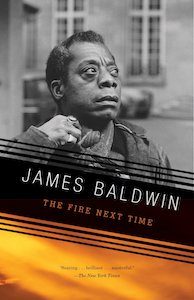
James Baldwin, The Fire Next Time, recommended by Lucy at Penguin UK:
In particular, The Fire Next Time is the one that has made such a huge impact on me for similar reasons to Rilke—in how to greet the world and not be destroyed, and what’s at the core of the human experience that can be clung to.
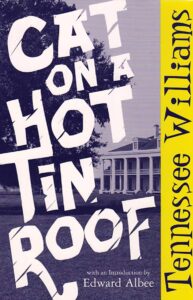
Tennessee Williams, Cat on a Hot Tin Roof, recommended by Julien in Vulture:
I read Cat on a Hot Tin Roof in one sitting, and it just tore me apart. The character of Brick is so interesting to me because often alcoholics are portrayed as either furious, dangerous people full of resentment, or people who drink out of just this pure need and compulsion. Tennessee Williams will have a page long of stage notes to talk about why Brick drinks, and it was just so sad. He just regards everything from this haze of indifference, because ultimately nothing matters to him. And the way that he medicates the disappointment and the disillusion that he’s experienced in his life is by drinking. It’s super-sad to see a person stripped.
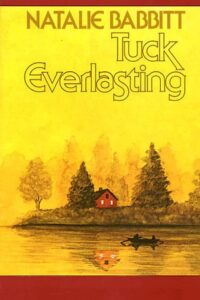
Natalie Babbitt, Tuck Everlasting, recommended by Lucy in The New York Times:
I used to read this book by Natalie Babbitt every year between ages 8 and 12. A couple falls in love and one of them [the boy] is immortal and wants the girl to become immortal, too. But she makes the decision not to, and in the final scene the boy goes and visits her grave. How hard-core is that? I liked the idea that even if you had the chance to live forever, you wouldn’t take it. Life is so precious, and the things that would change fundamentally if you were immortal would make it less brilliant.
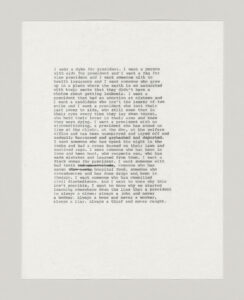
Zoe Leonard, “I want a president,” recommended by Julien in Vulture:
The poem is like, half queer futurity, dreaming of a time when queer people can be represented in a thoughtful way, and then also just half anger. Justified anger, that the people speaking on behalf of and governing marginalized communities often aren’t people that belong to those. So how can you have empathy?
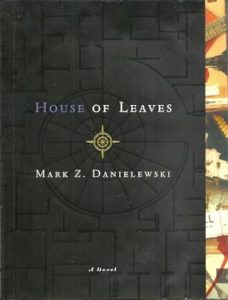
Mark Danielewski, House Of Leaves, recommended by Lucy in Clash:
I might have to say House Of Leaves by Mark Danielewski [is my favorite book] because it broke my understanding of books and what they can achieve. It’s hardly a book at all, it’s more like a sculpture with paper, words, and plot. I wouldn’t want to describe it any more than that.
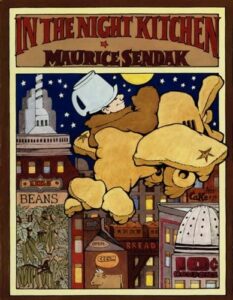
Maurice Sendak, In the Night Kitchen, recommended by Phoebe in One Grand:
Reading this with my parents is one of my earliest memories. I remember being fascinated by the naked body of a boy covered in dough. Probably the first penis I ever saw. I remember he makes a plane out of dough to get milk, and the best line by far is when he falls in, “I’m in the milk and the milk’s in me.”
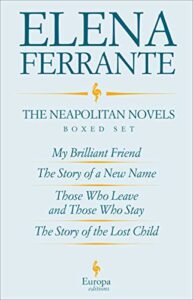
Elena Ferrante, the Neapolitan Novels, recommended by Lucy at Penguin UK:
I know everyone freaks out about these books, but I just love Elena Ferrante’s Neapolitan Novels. I like the representation of female friendship over many decades, and I like how they are bonded in a way that is like family, even in times when they wish they weren’t. They’re just a part of each other’s past. And they always circle back. So much of Home Video is about friendship and the nuance that can occur in childhood. I think that in retrospect, a lot of my friendships had different, like, backbones than I thought they did.
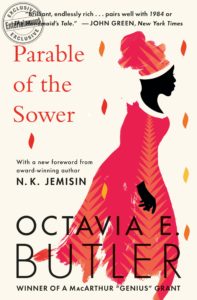
Octavia Butler, Parable of the Sower, recommended by Julien in The Au Review:
It was incredible and spiritually affecting.
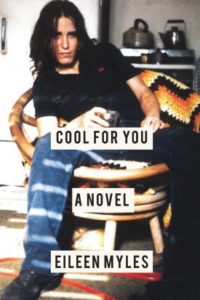
Eileen Myles, Cool for You, recommended by Lucy in Vogue:
Though the book is a novel, it reads like a memoir. It’s passionate and then plain, poetic and then personal. Their writing style is very accessible to me. I don’t know if that says more about me or them.
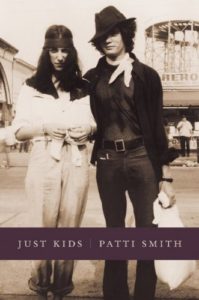
Patti Smith, Just Kids, recommended by Julien in Vulture:
It makes me think of my own memories, to read a book that’s just these jumbled vignettes of dashing around in the art scene and having this surreal, disjointed collection of experiences, but that’s how we tend to remember things. The dynamic in that book that really spoke to me was between her and Mapplethorpe. There’s this one line where she says, “I was good trying to be bad, and he was bad trying to be good.” I thought of that, when I read it the first time, really literally, like as if there could be a fundamentally good person and a fundamentally bad person striving to be something that they inherently were not. Now I think maybe the point of that sentence is, within the little description of her relationship with him, how those people viewed themselves and what society told them about themselves. I could see myself in my friendships as both Robert and Patti. It’s so sad, but there’s a great deal of empathy that can be exercised here.
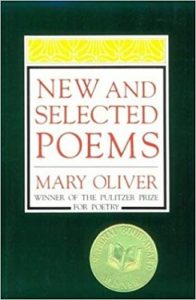
Mary Oliver, in general, recommended by Lucy in Vanity Fair:
I’ve been reading a lot of Mary Oliver. I would be so pleased if she ends up being an inspiration just because the feeling I get reading Mary Oliver is so unique—just so essential and grounded.
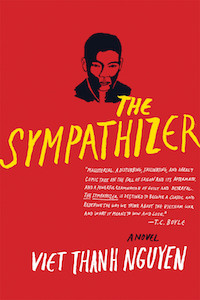
Viet Thanh Nguyen, The Sympathizer, recommended by Julien in The Au Review:
It’s one of my favorite books I’ve ever read, in all of time. It is so good.
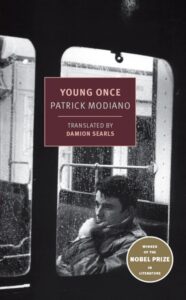
Patrick Modiano, tr. Damion Searls, Young Once, recommended by Lucy in Vogue:
The most French book I’ve ever read. It’s a thriller that isn’t very thrilling, if that makes sense. Yet I loved it. It’s slow-moving and graceful with a bit of ennui throughout. Peaceful pacing fits with warm-weather lazy days.
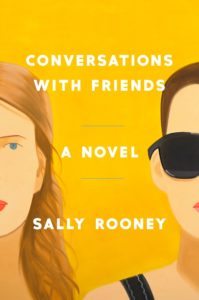
Sally Rooney, Conversations With Friends, recommended by Phoebe in One Grand:
Not a deep cut, I know, but this book deeply affected me last year. It made me feel like my life experience is completely unoriginal, and reaffirmed that I wish I was Irish.
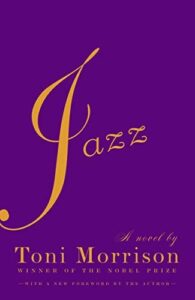
Toni Morrison, Jazz, recommended by Lucy in The Creative Independent:
That was amazing. I’m gonna read everything she’s ever written now.
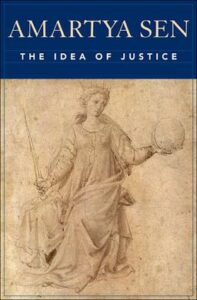
Amartya Sen, The Idea of Justice, recommended by Julien in Vulture:
I was in the middle of reading the book and muddling through, trying to absorb all of the terminology and define the terms that the author was working with and what they mean. And I was like, What am I doing? I am literally doing the same thing that I did for years with the Bible. I think I’m going to find some illuminating text that will make the world make sense to me and will make me understand what the right thing to do is. It talks about how you will never arrive at an institutional, singular practice of justice. If it is just to recognize everyone’s idea of what justice and fairness means, and it’s unavoidable that people will have different ideas about justice and fairness, then there’s literally no way.
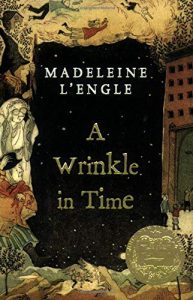
Madeleine L’Engle, A Wrinkle in Time, recommended by Lucy at Penguin UK:
You can see I’ve read it, scribbled in it; it’s got a sticker with my name on in it. I used to re-read this book every year. I would usually bring a book to school and during recess just sit under a tree, read and exit the world to enter a new one.
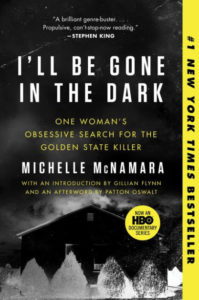
Michelle McNamara, I’ll Be Gone in the Dark, recommended by Phoebe in One Grand:
The Golden State Killer was active in California in the 70s and 80s, before I was born. Michelle McCnamera made it her life’s purpose to find out as much as she could about him and his victims, and she made incredible breaks in the case just sitting at home on her computer. She died unexpectedly in 2016, two years before The Golden State Killer was caught, and although the authorities didn’t officially give her credit for having a hand in catching him, the spotlight she shone on the case made an enormous difference at the very least.
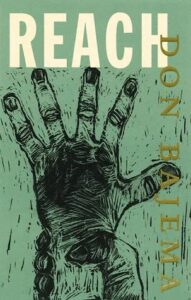
Don Bajema, Reach, recommended by Lucy in Clash:
I can’t even remember how I acquired it, but it’s a favorite of Henry Rollins and feels like it would be a hit amongst Beat Generation fans. I’m not usually into violent subject matter, but Bajema writes beautiful stories about a man and his various bouts with violence throughout his life.
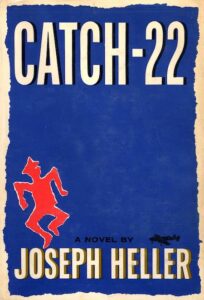
Joseph Heller, Catch-22, recommended by Julien in The Au Review:
I finally read Catch-22 and I really liked it.
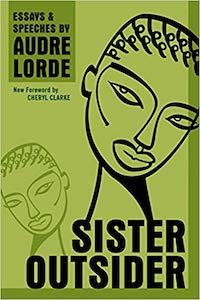
Audre Lorde, Sister Outsider, recommended by Lucy in The Creative Independent:
Right now I’m reading Sister Outsider by Audre Lorde and I’m just underlining the whole thing. It’s so poetic and beautiful. She’s totally the queen.
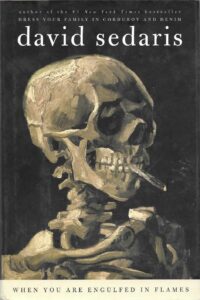
David Sedaris, When You Are Engulfed in Flames, recommended by Phoebe in One Grand:
I’ve read everything he’s ever published, but this one is still my favorite. Weirdly, it’s about his experience quitting smoking. I’m not a smoker but I think about the way he talks about addiction every day. And it’s mostly set in Japan, my favorite place on earth.
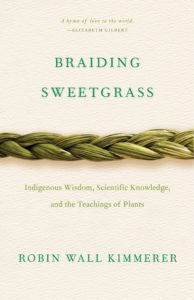
Robin Wall Kimmerer, Braiding Sweetgrass, recommended by Lucy at Penguin UK:
I limited myself to one essay per day, because I didn’t want to just burn through it. It’s just so gentle, it would quell panic attacks as I was reading it. And what a gift to interact with indigenous wisdom. I felt really lucky reading it. I’ll probably be re-reading that my whole life.
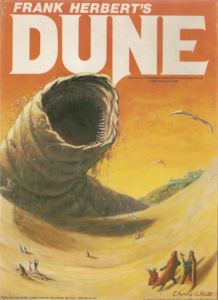
Frank Herbert, Dune, recommended by Lucy in Vogue:
Definitely the nerdiest book I’ve ever read, but it’s such a complete world and intriguing plot. For fans of Lord of the Rings and Game of Thrones. Plus it’s based in the desert, so I imagine it would be a great beach read. You’ll never think of water the same way.
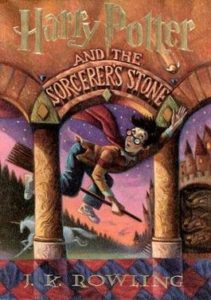
J.K. Rowling, Harry Potter and the Sorcerer’s Stone, recommended by Phoebe in One Grand:
The first book I ever really wanted to read on my own. I spent hours as a kid staring at different stuff in my room, trying to make something levitate. To this day, when most people would reference the Bible to make a point about morality or whatever, instead of Judas or Jesus, I’m more likely to bring up Snape or Sirius. When I miss home on tour and can’t get to sleep, I listen to the audiobooks. My inner monologue is narrated by Jim Dale.
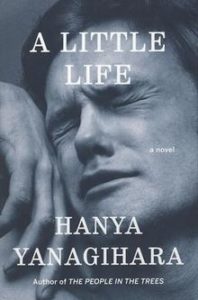
Hanya Yanagihara, A Little Life, recommended by Lucy in Southwest Review:
Five friends were reading that book at the same time and recommended it to me. By the time they finished, they had rescinded their recommendations, but I was already halfway through. I have a hard time telling people to read it because it is so brutally sad, but I think it’s an incredible book. There’s a scene where a character describes losing a son and says that people talk about the grief associated with death, but they don’t express the relief that washes over you once your worst fears have been realized. The line [in “Triple Dog Dare”] inspired by the book is “nothing worse could happen now.”
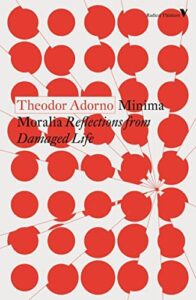
Theodor Adorno, Minima Moralia, recommended by Julien in Vulture:
He’ll focus in on how the means of production permeate all of our lives, or how participating in the existing massive government structures actually doesn’t benefit us all that much. It’s devastating to read, but it’s also weirdly comforting that someone took the time to write down how everything is broken. If I were Theodor Adorno, I wouldn’t have finished writing that book. I would have given up and realized I’m writing a book about futility that is ultimately going to be another futile act in a futile world.
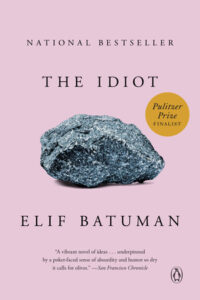
Elif Batuman, The Idiot, recommended by Lucy in Vox:
Most recently, I really liked this book called The Idiot by Elif Batuman; it’s pink and has a rock on the front. It was a recommendation from a lot of my friends, and it has an amazing use of new technology. It’s a book about language and email and romance and cultural identity, and usually I wouldn’t like books talking about an iPad or something because it kind of dates it. But this book tackles communication in a way that I haven’t read before. The pace was really slow, but it was hilarious. I wouldn’t even really call it a comedy, but the main character’s observations and commentary have a lot of humor in it.
And by Phoebe in One Grand:
Don’t judge a book by its plot. The story of a girl who has a crush at school. But the writing is better than Salinger.
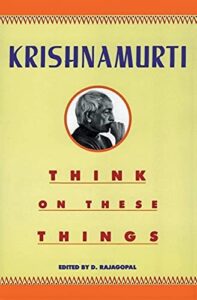
Krishnamurti, Think on These Things, recommended by Lucy in Vogue:
Solace for the soul. One of the wisest people I have been lucky enough to read. I’ve never been into self-help, but reading this did feel like helping myself. A great summer read if you’re willing to read a paragraph, let your mind ruminate on it for an hour, and then move on to the next paragraph.
BONUS:
Also mentioned by Lucy:
Leo Tostoy, War and Peace (Vanity Fair); Maggie Nelson, Siri Hustvedt, James Baldwin, Nancy Milford . . . Dead Souls by Nikolai Gogol, the second book in Karl Von Knausgaard’s My Struggle series, No Is Not Enough by Naomi Klein, Arabian Nights, and Bark by Lorrie Moore. (Clash)
Also mentioned by Julien:
Marilynne Robinson, Gilead—recommended by Lucy to Julien, naturally (Billboard)
And one single dislike (sort of) from Lucy:
I used to love Fitzgerald but I recently read a biography of Zelda Fitzgerald that makes me cringe about F. Scott as a person. (Clash)


